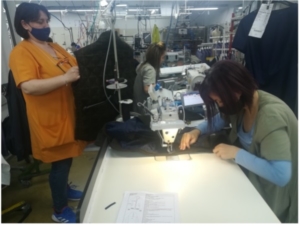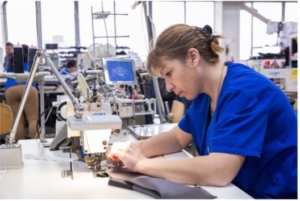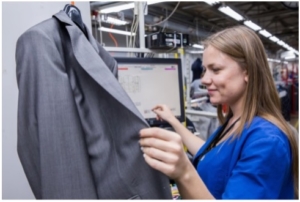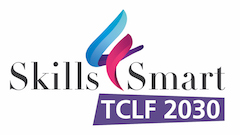The clothing industry – light, but dynamic

Behind every beautiful garment, there is a long process of manufacturing that goes through many various stages. So, we come to the question: “Who made my clothes?”
The clothing industry is the large-scale industrial sector producing billions of garment pieces each year. From workwear to fashion, many products are PIRIN-TEX, as a large enterprise with a decades-long tradition in garment manufacturing, has a very versatile palette of professional profiles. The company is a leading garment producer from Bulgaria that is supporting the Skills4SmartTCLF project by sharing their knowledge and taking part in several activities.
In the process of fabrication of any piece of clothing, it can span from the digital construction of a garment style based on a sketch or just a designer’s idea to the delivery of the ready-made pieces at the customer’s warehouse. These are the key professional profiles (among many others) that are vital for the company:
Construction (CAD/CAM)
The creative CAD/CAM department constructs patterns and markers based on sketches or photos of the style provided by the customer (i.e. by the fashion brand and its design team). The digital markers are then used for the cutting process by transferring them to the automatic cutting machines that cut the fabrics . Following the production of the first prototype of a style and the feedback from the customer, the CAD/CAM department makes the necessary alterations to the original patterns until the style receives the final approval from the customer. An important role plays also the construction of different metal patterns, matrixes and other auxiliary tools for the machinery and equipment, which are utilized for the execution of specific orders or operations. Within the Smart4SkillsTCLF project, one of the profiles that have been recognized by partners as an important profile is the Clothing CAD Pattern Maker. It has a combination of engineering and design skills by working with designers and engineers to produce its concept
fashion brand and its design team). The digital markers are then used for the cutting process by transferring them to the automatic cutting machines that cut the fabrics . Following the production of the first prototype of a style and the feedback from the customer, the CAD/CAM department makes the necessary alterations to the original patterns until the style receives the final approval from the customer. An important role plays also the construction of different metal patterns, matrixes and other auxiliary tools for the machinery and equipment, which are utilized for the execution of specific orders or operations. Within the Smart4SkillsTCLF project, one of the profiles that have been recognized by partners as an important profile is the Clothing CAD Pattern Maker. It has a combination of engineering and design skills by working with designers and engineers to produce its concept
Procurement
The procurement department is in charge of research, purchase and delivery  of the materials (fabrics, trims, labelling and packaging) which are required for clothing manufacturing. The employees in this department are in regular communication with various suppliers worldwide and organize the timely procurement in an effective and cost-efficient way. They also coordinate the procurement process with the customers who, in many cases, nominate themselves as some of the material suppliers for the products they order. Moreover, the colleagues in the procurement department create the Bills of Material (BOM) by calculating the exact consumption and costs of every single material used in the manufacturing of each garment style.
of the materials (fabrics, trims, labelling and packaging) which are required for clothing manufacturing. The employees in this department are in regular communication with various suppliers worldwide and organize the timely procurement in an effective and cost-efficient way. They also coordinate the procurement process with the customers who, in many cases, nominate themselves as some of the material suppliers for the products they order. Moreover, the colleagues in the procurement department create the Bills of Material (BOM) by calculating the exact consumption and costs of every single material used in the manufacturing of each garment style.
Process timeline analysis
The timeline analysis (also known as REFA) department is engaged with the organization of the workplace – anthropometry and working equipment as well as with the ways of standardisation (rate-setting) of the working time and the methods for calculating labour costs. The aim is to achieve effective organisation of the manufacturing process and to secure ergonomic and cost-efficient standardisati

on of labour. The Process & production timeline analyst has also been recognized within the Skills4SmartTCLF project as an important cross-sectoral job. In a work environment, this professional profile has a piece of certain knowledge and experience in the manufacturing technology which is significant to understand either the needs of production planning, costing or working methods.
Technologists and production team leaders

Quite dynamic is the activity of the technologists and production team leaders. They are acquainted with all main processes of clothing manufacturing as well as with the necessary machines and equipment. The technologists develop and apply the technological sequence for the manufacturing of the given style. They work in close collaboration with the production team leaders. The latter has a constant direct view on the production team they are responsible for, and watch for the smooth organization in it as well as for the timely lead-time of the pieces which are being manufactured by their team.
Customer service
The customer service specialists lead everyday communication (by e-mail, phone and sometimes other social media) with the company’s clients and are the first point of contact when a new production order comes in. Their role is not only to transmit the information from the customer to the other departments but also to anticipate the customer’s needs and wishes and to advise and support them during the whole manufacturing process. The customer service specialists make sure that the manufacturing is done according to the customer’s requirements and are responsible for communicating and clarifying all technical details that arise from the order entry till the delivery of the final product.

Machine operators
These jobs represent the largest share of employees within a typical clothing company. They include workers engaged in cutting (manual cutting or cutting with a CNC automatic cutting machine), sewing operations (with different types of sewing machines and sewing automats), pressing and ironing.
Quality control
The quality control employees are responsible for spotting any defects that may have appeared during garment manufacturing. The control is organized at various stages throughout the manufacturing process and aims to secure a flawless end product before warehousing.
Garment finishing (Garment wash & Garment dye)
Garment wash and garment dye are wet processes, which are getting more and more important nowadays.
In view of the growing demand for more casual-looking garments, and are in the hands of employees with education or background in the field of chemistry. These colleagues develop colour recipes according to the customer’s wishes and make fabric tests with them before the colour has been finally approved for bulk production. Following the colour approval, they execute the industrial washing or dyeing of the ready-sewn garments in specialized machines, while taking into account how the different fabrics and trims react to the wet processes.
These are just some of the main profiles that a clothing enterprise needs in order to offer the complete garment manufacturing service to its clients. Besides these professions there is a long list of other jobs that are indispensable for the clothing industry, such as logistics specialists, warehouse workers, wage calculation specialists, just to name a few. In other words, the palette of profiles in the clothing industry is not less versatile than the products it creates.
Author: Nikolay Uzunov – PIRINTEX
Visuals: © PIRINTEX


